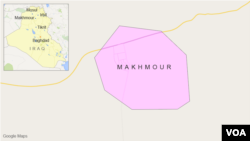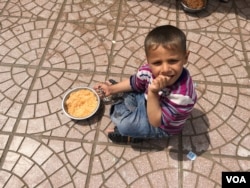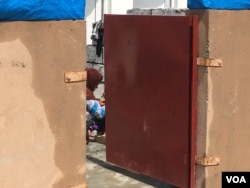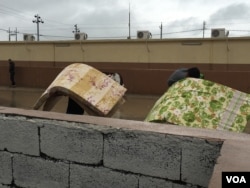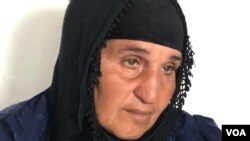Just a few days ago, under cover of U.S. fighter jets roaring overhead and dropping bombs, Arif picked up his family and relatives and ran barefoot out of his village.
“We walked 20 to 25 kilometers until we reached here, we walked across the desert and valleys, and we walked through fields that were mined,” he said.
After more than a year and half of living under the Islamic State group, Arif and his family were free.
He and about 6,000 others are now in a small Kurdish-run camp set up in the gravel and mud to take in villagers fleeing Islamic State as the Iraqi army started its push to retake the area south of Mosul.
Life under Islamic State rule
A day of interviews with five different men, some single, some fathers, some teenage sons, revealed what life was like under Islamic State. Most did not give their full names out of fear that IS would take revenge on relatives left behind.
Men were fined or whipped if their women were seen without the full face-covering niqab. Men were fined or whipped if their beards were not long enough. Men were beaten if they were found with cigarettes. Children in school were taught how to count with bullets.
A former Iraqi military man himself, Arif was one of many Sunnis who stayed in their villages when the largely Sunni extremist group Islamic State took over in 2014.
And like several of the men who managed to escape to this camp, Arif described a life that soon turned brutal, then unlivable. Jobs were scarce and badly paid or dangerous. Families were running out of money.
Desperate for money themselves, IS members were running extortion rackets, ranging from cigarette sales to human trafficking.
Anyone affiliated with the Iraqi government, like the former police, had to pay IS a $2,000 “repentance” bond, or be killed, they said. Unable to pay, many just hid in their homes.
IS also offered to smuggle people out -- for a fee of anywhere between $300 to $2,000, they said.
“It works two ways,” said Ahmed, one of a crowd of some 20 men who wanted to tell their stories, but did not want to give their full names.
“Most IS members get paid 60,000 dinar ($50) a month which is very little, so they use this (smuggling) to get money for themselves,” he said. Or, when IS in the area was running low on money, they would collectively “raise as much money as they can and then release some of the people."
Arif, standing slightly taller than the crowd, stuck his hand into the middle of the circle holding a pack of cigarettes and described another favorite IS scheme.
“This pack of cigarettes usually costs 500 dinar (50 cents). Under IS, it costs 5,000 dinar ($5). So, an IS person comes to you and convinces you to do some business selling cigarettes to the neighborhood. Once you have the merchandise, they send another IS guy who whips you 75 times, takes the cigarettes and all the proceeds you have made,” he said.
In another version of the same extortion game, when all the cigarettes were sold, a high-ranking IS member from Syria would come and collect all the money, Arif said.
Teenager Saifuddin Mohamed, who ran away April 7, said he tried to make money on the cigarette scheme to feed his family, but got beaten for it.
“IS took me and beat me badly for selling cigarettes. It was a warning,” he said, asking that his photograph not be taken. “After that I stayed home.”
Breakdown of education system
Schools also cost money. Again, many villagers could not afford to pay, so their children stayed home. Which, for some, was not a bad choice.
“The curriculum is all about bombs, how to use guns, how to identify tanks and weaponry,” said Ahmed Saleh Mohammed from Kudela village.
Saleh Mohammed said as they lived in villages, IS was less bothered with their children. But in the cities, children were being forced to attend IS-run schools.
Then when the U.S. started its fierce airstrike campaign, the schools closed, he said.
Dressed in a football jersey, and sitting with one knee tucked under him on a flimsy foam mattress on the cement floor, Saleh said his teenage brothers stayed home, too.
“They terrorized us. We had to get outside, to play some football, and they used to come and shoot rounds in the air just to keep us from playing,” he said.
Saleh Mohammed was an ambulance driver.
“I have not received a salary for a year and a half, so it was extremely difficult to support my family. There are no salaries,” he said.
According to several of the men, under IS there is a system of SmartCards where retired civil servants and others can get money.
“Sometimes they work, and sometimes they don’t,” said Saleh Mohammed.
Finally, he tried to support his family by running a mobile shop out of his car. But after a while, he said, no-one had money to buy anything.
Then IS demanded that all cars be registered. Saleh could not afford it. In the end, he said, he could neither drive the car nor sell it. Trapped, he too stayed in his house.
Prior to Islamic State declaring its Sunni extremist version of an Islamic “caliphate” across Iraq and Syria, many Iraqi Sunnis had been systematically repressed by Iraq’s sectarian Shi’ite government – just as Saddam Hussein had repressed Shi’ites before that.
Enforcement of Islamic State rules
For some of the conservative tribal Sunni in these villages, life under IS was just one more set of rules.
“No-one from IS actually did anything to harm us,” said a female relative sitting next to Saifuddin Mohamed.
“They gave us orders to wear the niqab and we followed it. We built a higher fence so IS could not see us from outside so we did not have to wear the niqab to the bathroom,” she explained.
Most village houses build their bathrooms outside the main house.
The woman said IS had given poor families like hers 50,000 dinar ($40) a month. But it was not enough. And after the coalition airstrikes hit houses next to theirs, they fled.
“The biggest problem we had was financial. We could not support ourselves. And this applies to most of the families in our village. Men were sitting at home without jobs, we could not feed our children -- and the bombings – that is why we left.”
Resistance was dangerous
But the men spoke of how those who disobeyed or protested Islamic State rules would disappear.
“My brother-in-law was taken by IS a year or so ago. He was a former military commander. No-one knows where he is. We don’t know if he is in prison or dead. There is no place where we can check on the status of those taken,” said one young man, standing outside the camp mosque.
He said the only document families will get is a piece of paper that confirmed a death. Then again, the young man said, sometimes a family will get that paper, and the missing family member shows up anyway.
“They don’t want people constantly asking, ‘Where is my brother? Where is my brother-in-law?’ ” he said.
PHOTO GALLERY: Iraqi refugees flee Islamic State militants






